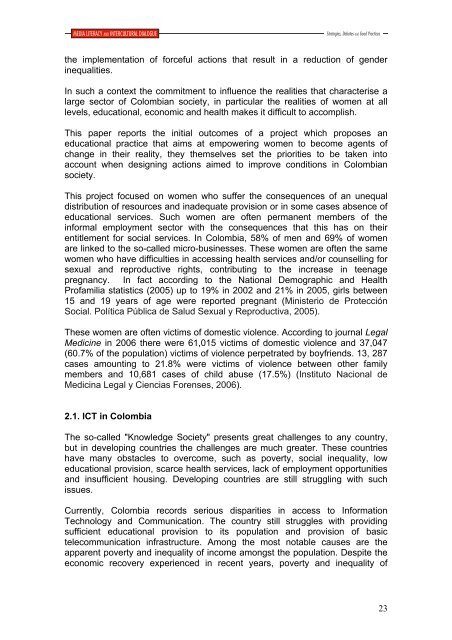Libro
Libro
Libro
Create successful ePaper yourself
Turn your PDF publications into a flip-book with our unique Google optimized e-Paper software.
MEDIA LITERACY AND INTERCULTURAL DIALOGUE<br />
Strategies, Debates and Good Practices<br />
<br />
the implementation of forceful actions that result in a reduction of gender<br />
inequalities.<br />
In such a context the commitment to influence the realities that characterise a<br />
large sector of Colombian society, in particular the realities of women at all<br />
levels, educational, economic and health makes it difficult to accomplish.<br />
This paper reports the initial outcomes of a project which proposes an<br />
educational practice that aims at empowering women to become agents of<br />
change in their reality, they themselves set the priorities to be taken into<br />
account when designing actions aimed to improve conditions in Colombian<br />
society.<br />
This project focused on women who suffer the consequences of an unequal<br />
distribution of resources and inadequate provision or in some cases absence of<br />
educational services. Such women are often permanent members of the<br />
informal employment sector with the consequences that this has on their<br />
entitlement for social services. In Colombia, 58% of men and 69% of women<br />
are linked to the so-called micro-businesses. These women are often the same<br />
women who have difficulties in accessing health services and/or counselling for<br />
sexual and reproductive rights, contributing to the increase in teenage<br />
pregnancy. In fact according to the National Demographic and Health<br />
Profamilia statistics (2005) up to 19% in 2002 and 21% in 2005, girls between<br />
15 and 19 years of age were reported pregnant (Ministerio de Protección<br />
Social. Política Pública de Salud Sexual y Reproductiva, 2005).<br />
These women are often victims of domestic violence. According to journal Legal<br />
Medicine in 2006 there were 61,015 victims of domestic violence and 37,047<br />
(60.7% of the population) victims of violence perpetrated by boyfriends. 13, 287<br />
cases amounting to 21.8% were victims of violence between other family<br />
members and 10,681 cases of child abuse (17.5%) (Instituto Nacional de<br />
Medicina Legal y Ciencias Forenses, 2006).<br />
2.1. ICT in Colombia<br />
The so-called "Knowledge Society" presents great challenges to any country,<br />
but in developing countries the challenges are much greater. These countries<br />
have many obstacles to overcome, such as poverty, social inequality, low<br />
educational provision, scarce health services, lack of employment opportunities<br />
and insufficient housing. Developing countries are still struggling with such<br />
issues.<br />
Currently, Colombia records serious disparities in access to Information<br />
Technology and Communication. The country still struggles with providing<br />
sufficient educational provision to its population and provision of basic<br />
telecommunication infrastructure. Among the most notable causes are the<br />
apparent poverty and inequality of income amongst the population. Despite the<br />
economic recovery experienced in recent years, poverty and inequality of<br />
23



